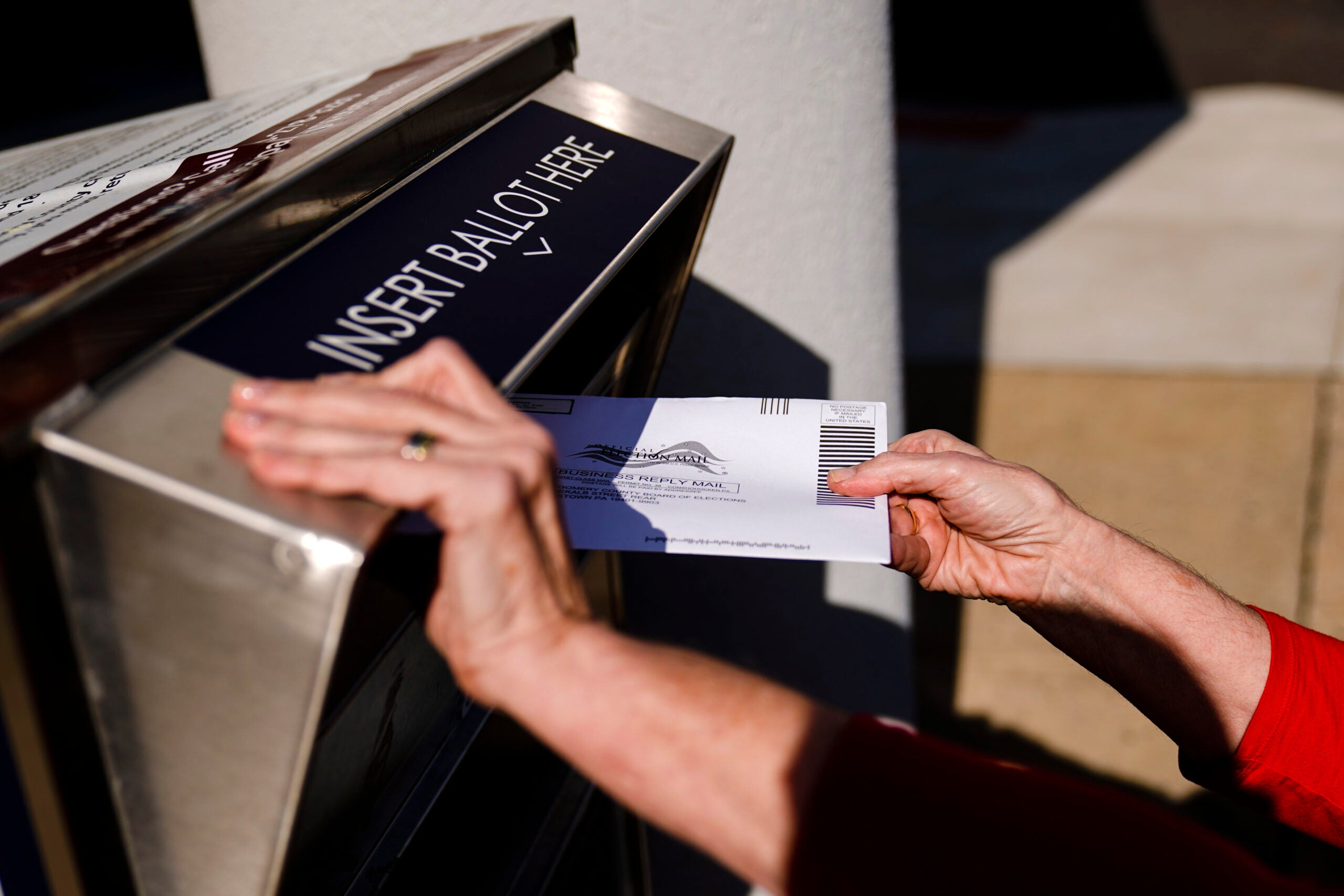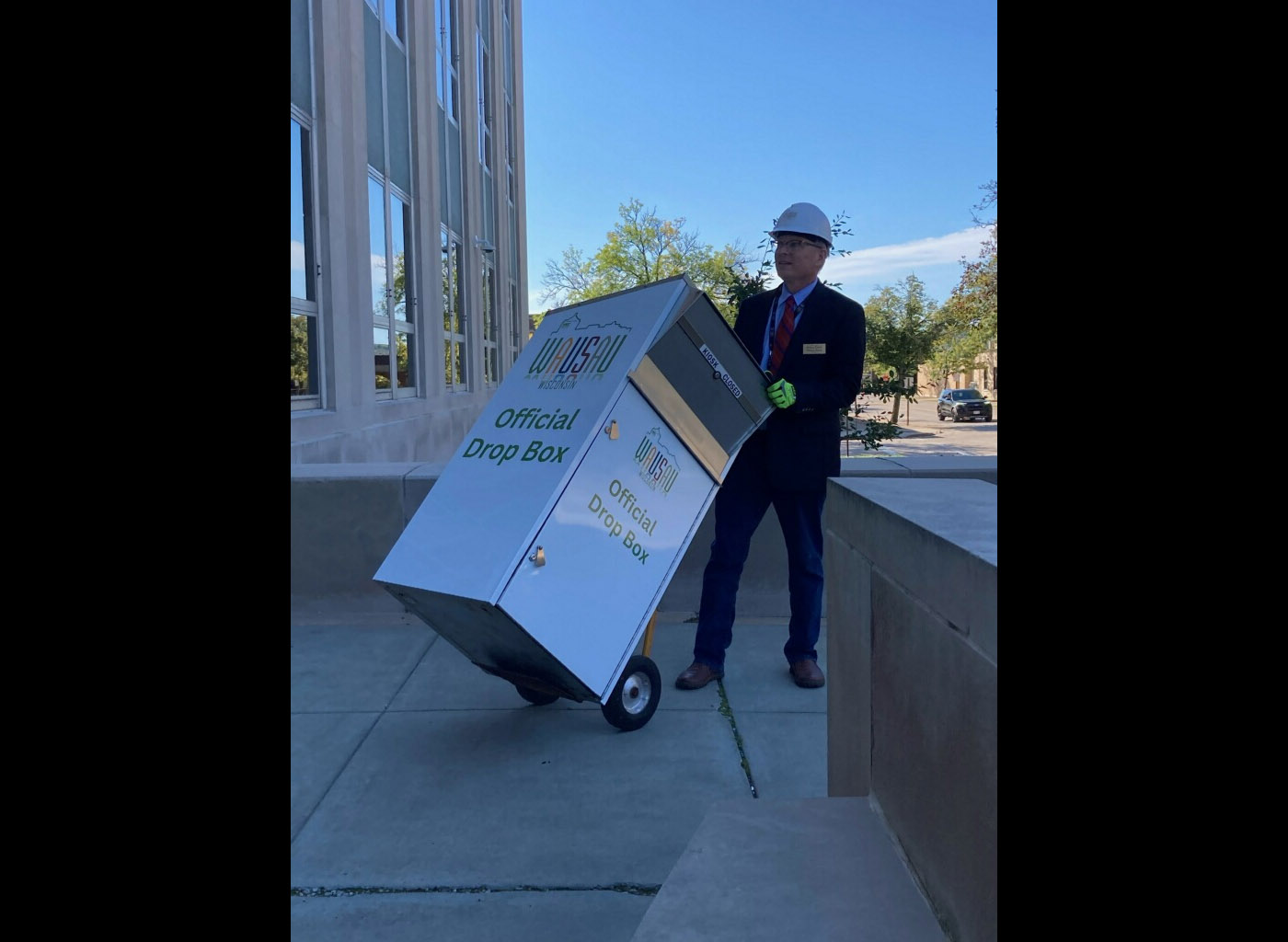Absentee ballot drop boxes won’t be allowed in Wisconsin under a ruling handed down Friday by a divided Wisconsin Supreme Court.
The court’s conservative majority also ruled that it’s illegal for someone else, like a spouse or roommate, to return a voter’s completed absentee ballot to the clerk’s office. The voter must carry out that task personally.
The majority decision was written by Justice Rebecca Bradley and joined by the rest of the court’s conservative majority, including swing Justice Brian Hagedorn.
News with a little more humanity
WPR’s “Wisconsin Today” newsletter keeps you connected to the state you love without feeling overwhelmed. No paywall. No agenda. No corporate filter.
Both rulings mean absentee voting in Wisconsin’s 2022 election and beyond won’t be as convenient as it was two years ago when it surged during the early stages of the COVID-19 pandemic.
“Nothing in the statutory language detailing the procedures by which absentee ballots may be cast mentions drop boxes or anything like them,” Bradley wrote.
The Wisconsin Elections Commission issued guidance in 2020 providing local clerks with advice on the best practices for unstaffed drop boxes if they chose to use them. Bradley wrote that guidance exceeded the WEC’s authority.
“WEC’s staff may have been trying to make voting as easy as possible during the pandemic, but whatever their motivations, WEC must follow Wisconsin statutes,” Bradley wrote. “Good intentions never override the law.”
Bradley also wrote that absentee ballots delivered in person at a clerk’s office must be delivered by a voter, and no one else.
“Reading the election statutes in context and as a whole, we conclude an absentee ballot delivered in person … must be delivered personally by the voter,” Bradley wrote.
The court’s ruling did not address whether someone who votes absentee by mail must personally place their ballot into a mailbox, meaning someone else could still complete that task.
The court’s liberals dissented, with Justice Ann Walsh Bradley writing that the ruling would make it harder to vote.
“Although it pays lip service to the import of the right to vote, the majority/lead opinion has the practical effect of making it more difficult to exercise it,” wrote Justice Walsh Bradley. “A ballot drop box is a simple and perfectly legal solution to make voting easier, especially in the midst of a global pandemic. But it is apparently a bridge too far for a majority of this court.”
The number of drop boxes in Wisconsin grew dramatically in 2020 as the COVID-19 pandemic caused interest in absentee voting to spike as many residents looked for ways to avoid in-person voting. Roughly 2 million residents voted absentee in the November 2020 election, shattering the previous record. While many voted absentee by mail, drop boxes were billed as an option for people who were worried about potential delays in the U.S. Postal Service.
According to the Wisconsin Elections Commission, there were 528 drop boxes in use in the 2020 presidential election spread across 430 municipalities. By the spring of 2021, local officials reported a total of 570 drop boxes spread across 66 of Wisconsin’s 72 counties.
A group of plaintiffs represented by the conservative Wisconsin Institute for Law and Liberty filed a lawsuit to end the practice, arguing that drop boxes were not explicitly allowed under Wisconsin law. WILL also argued that state law required a voter — and no one else — to return their own ballot. WILL argued that requirement applied whether a ballot was being returned at their clerk’s office or by mail.
In January, Waukesha County Judge Michael Bohren sided with WILL, ordering the Wisconsin Elections Commission to rescind its guidance to clerks on how to use the drop boxes. Bohren said the WEC had exceeded its authority when it issued the recommendations.
The state Supreme Court initially stayed Bohren’s ruling for the February primary, leaving drop boxes in place for that low-turnout election. But justices allowed Bohren’s order to take effect for the April election. Both orders were decided 4-3, with Hagedorn casting the deciding vote.
Those fighting the lawsuit, including the WEC, argued clerks were within their legal rights to create alternate sites for returning absentee ballots. Others fighting the case, including Disability Rights Wisconsin, argued banning other people from returning a voter’s ballot could disenfranchise tens of thousands of voters whose physical disabilities prevent them from physically putting their own absentee ballots in the mail.
During oral arguments for the case in April, WILL’s assertion that only a voter could return their absentee ballot — even by mail — drew extensive questioning from justices, with one suggesting the conservative group’s argument was “absurd.”
While justices left the issue of mailing absentee ballots unaddressed, most of WILL’s argument prevailed with the court’s conservative majority, including with Hagedorn, whose vote has proven critical.
“This case is not about the risk of fraudulent votes being cast or inspiring confidence in elections,” Hagedorn wrote in a concurring opinion. “This is not about ensuring everyone who wants to vote can, nor should we be concerned with making absentee voting more convenient and secure. Those are policy concerns, and where the law does not speak, they are the business of the other branches, not the judicial branch. This case is about applying the law as written; that’s it.”
Hagedorn said a careful study of the law revealed that unstaffed drop boxes for absentee ballots are not permitted. He also indicated that delivering a ballot to the clerk “contemplates a person-to-person exchange” either with the clerk or their authorized representative.
“Our obligation is to follow the law, which may mean the policy result is undesirable or unpopular,” Hagedorn wrote. “Even so, we must follow the law anyway.”
WILL president and general counsel Rick Esenberg said the court’s ruling sent a clear sign that it’s the duty of the Legislature — not the WEC — to establish the rules for elections.
“If you want drop boxes, then what you have to do is you have to go to the Legislature and you have to ask the Legislature to authorize them,” Esenberg said.
The liberal group Law Forward, which fought the lawsuit, said the practical effect of the decision is that absentee voting would be harder.
“Decisions like today are a reminder that Wisconsin’s longstanding reputation of being a laboratory of democracy is the type of reputation that is hard to earn and can be easily lost,” said Law Forward attorney Scott Thompson.
Disability Rights Wisconsin said in a written statement calling the decision disappointing, saying it would affect the voting rights of thousands of Wisconsinites with disabilities. But the group said those voters’ retained federal protections.
“The right for voters with disabilities to have assistance from a person of their choice is protected by federal law,” said Disability Rights Wisconsin’s Barbara Beckert. “Nothing in this decision changes federal protections for people with disabilities.”
While the court’s decision emphasized the right of the Legislature to set election policy in Wisconsin, there’s no indication that the current Legislature is interested in passing the kinds of bills Gov. Tony Evers will sign, or vice versa.
Evers issued a statement stressing the importance of making it easier to vote, not harder.
“Today’s decision is another in a long line of Wisconsin Republicans’ successes to make it harder for Wisconsinites to exercise their right to vote, to undermine our free, fair, and secure elections, and to threaten our democracy,” Evers said.
Today’s #SCOWIS decision is another in a long line of Wisconsin Republicans’ successes to make it harder for Wisconsinites to exercise their right to vote, to undermine our free, fair, and secure elections, and to threaten our democracy. Read my full statement ⬇ pic.twitter.com/CBOwLoYveP
— Governor Tony Evers (@GovEvers) July 8, 2022
Assembly Speaker Robin Vos, R-Rochester, celebrated the decision.
“Today’s decision demonstrates that the rule of law prevails and the illegal drop boxes are finally going to stop,” Vos said. “This is a giant step forward in our efforts to ensure election integrity. Our next step has to be electing a new governor who will sign additional election reforms.”
Two of the Republican candidates for governor — Rebecca Kleefisch and Tim Michels — issued statements of their own celebrating the decision.
Both have endorsed a long list of changes to election laws, including the elimination of the Wisconsin Elections Commission.
GOP lawmakers also passed a bill this past legislative session that would have prescribed who is allowed to mail another person’s ballot. Evers vetoed the plan.
Wisconsin Public Radio, © Copyright 2025, Board of Regents of the University of Wisconsin System and Wisconsin Educational Communications Board.






